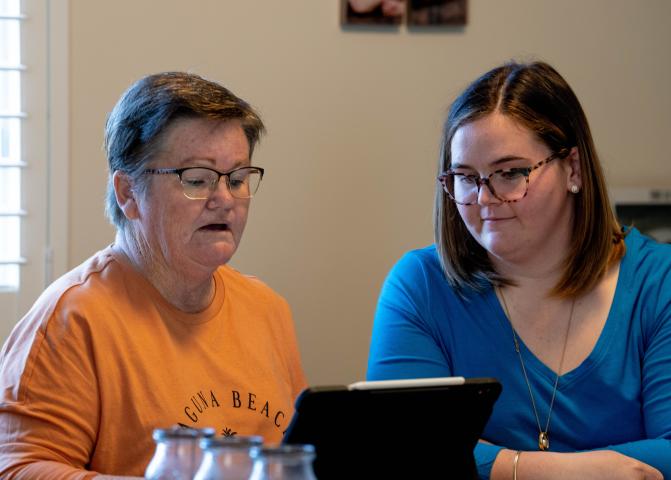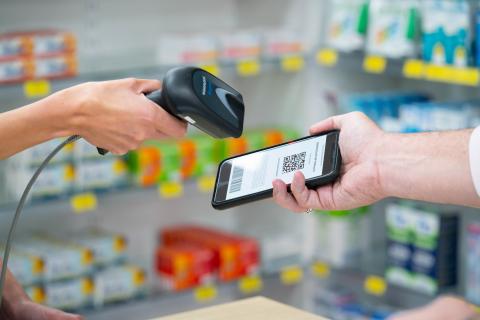
Cyber security
Protecting you and your health data - we work hard to keep your health information safe and secure.
Did you know that your health information can be even more attractive to cyber criminals than your financial details?
The following information should be used as a guide to help protect you and your family from cyber threats when you are accessing and using digital health tools.
Learn how to protect your health information online
My Health Record is a safe and secure place to keep your key health information, available to you and your healthcare providers anytime, including in an emergency. The 1800MEDICARE app is a secure and convenient way to access My Health Record on your mobile devices.
To ensure that your record remains secure and safe, consider taking these actions:
- Use a strong passphrase and secret question to access My Health Record
- Regularly review your My Health Record access log and report any misuse
- Manually enter your sign-in details, and avoid clicking on links in emails to sign in. Note that the Digital Health Agency will never request sign-in information via email or over the telephone.
- Set strong privacy settings on your accounts and devices
- Enable automatic software updates to ensure that your devices and applications are up-to-date with the latest security patches.
More security information
Electronic prescriptions are a digital version of a paper prescription, sent via a text message or email to your mobile device.
To ensure your safety and privacy when using electronic prescriptions, consider the following tips:
- Keep your contact details up to date – make sure your prescriber, and dispenser/pharmacist has your current mobile number and email address before they prescribe or dispense an electronic prescription
- Protect your personal email accounts by creating a strong passphrase or password and not sharing those details with anyone. Enable multi-factor authentication (MFA) and set up a secondary email as a trusted backup account in case you lose access to the current account. Review your email account history regularly for suspicious logins or activity.
- If you are using a mobile app to manage your electronic prescriptions, make sure you only use verified safe apps. Check the conformant software and apps register to ensure the app is legitimate and secure.

Telehealth services allow you to access healthcare from the comfort of your home through phone or video calls. However, it's important to take precautions to protect your privacy and security when using these services. Consider the following tips:
- When answering a telehealth call, verify that you are speaking to a healthcare provider before sharing any personal information
- Find a quiet and private location to conduct your telehealth consultation to prevent others from overhearing any confidential information
- If using a video call, avoid using free and unsecured Wi-Fi networks to access your accounts. Instead, use your mobile data or encrypted Wi-Fi networks to ensure the privacy of your data.
- Protect your internet connectivity by using a reputable virtual private network (VPN), especially if you rely on free Wi-Fi networks. This can help to ensure the confidentiality of your personal information and prevent unauthorised access to your data.

When using mobile devices to access digital health tools, it’s crucial to prioritise security. Keeping your sensitive information safe from unauthorised access is essential, whether it's stored on or transmitted by your devices, including laptops, smartphones, tablets, wearables, and other portable devices. To ensure that your devices are secure, the following tips can be helpful:
- Set up a screen lock on your device (e.g. a passcode, PIN or biometrics, such as finger prints or face ID) to stop unauthorised access
- Keep the device’s operating software up to date – set up automatic updates so you don’t have to do this manually
- Install and use secure and reputable apps only by downloading mobile apps from official app stores (e.g. Google Play and App Store)
- Set permissions for new apps to be installed (e.g. requiring a password) to stop unwanted installations – this can be managed through parental controls
- Set up your device and applications to have passphrases over passwords as they offer better protection from cyber attacks. They are harder to guess but easier for you to remember.
- Remove apps and software when you no longer need them
- Protect your device with a reputable anti-virus software (if available for your device) which is kept up to date
- Keep the device physically safe and secure – don’t leave unattended in public place
- Regularly back up your devices
- Ensure your portable devices like tablets, laptops or any other portable device with access to the internet are secure.
By following these recommendations, you can help keep your devices secure and safeguard your data against potential cyber security breaches or attacks.
Learn more
When you access the internet, your devices become vulnerable to potential cyber security threats. To ensure that you maintain a secure internet connection, consider following these steps:
- Avoid using free and unsecured Wi-Fi networks to access your accounts – use your mobile data or encrypted Wi-Fi networks instead
- Access the internet using web browsers that are up to date – never save your passwords to a web browser that is public or shared with others to prevent unauthorised access
- Protect your internet connectivity with a reputable virtual private network (VPN) – some antivirus subscriptions will come with VPN licences you can use across your personal devices.
By taking these precautions, you can help protect your devices from online cyber security risks and maintain a safer online experience.

How to spot cyber threats and avoid them
Cybercriminals are always looking to access your information for their own financial gain. To protect yourself from their malicious tactics, it's important to stay vigilant and take steps to secure your online activities. Consider following this guidance:
- Do not open attachments or links in emails, social media or SMS messages unless you’re sure they are safe – contact the company directly if you want to validate their requests using phone numbers or email addresses you have sourced independently
- Know that trusted organisations such as your bank or government departments will not never ask you to share your password or require remote access to your device
- If you provide your username and password to a cybercriminal through a scam website or phone call, update the details immediately and report it to your service provider
- Stay up to date on the latest scams with Scamwatch. See Scamwatch’s Twitter for the latest scams. This content is updated weekly, and you do not need a Twitter account to view.
- Check regularly for alerts and advisories to find the latest cyber security alerts and advice
- Stop and think before you share content on social media - cybercriminals can use information you have publicly posted on your social media accounts in their scams and cyberattacks.
By being aware of cybercriminal tactics and implementing these measures, you can safeguard your sensitive information and prevent falling victim to online scams or cyber attacks.
Learn more about cyber threats.